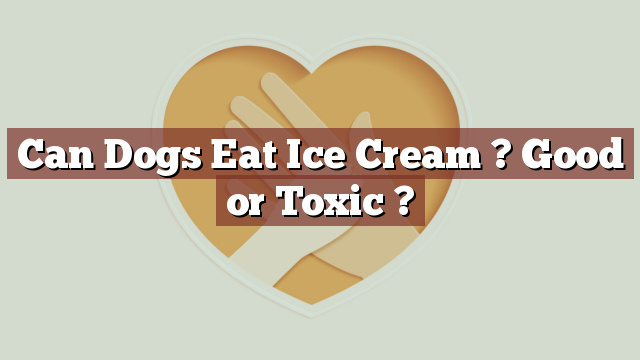Can Dogs Eat Ice Cream? Good or Toxic?
Ice cream is a popular treat enjoyed by many people around the world. It is often indulged in during hot summer days or as a special dessert. As pet owners, it is important for us to be aware of the foods that are safe for our furry friends to consume. So, can dogs eat ice cream? Let’s delve into this question and explore the nutritional value, potential risks, and benefits of feeding ice cream to dogs.
Nutritional Value of Ice Cream for Dogs: What’s Inside?
Ice cream typically contains ingredients such as milk, sugar, and flavorings like chocolate or fruits. While these components may be harmless for humans, they can pose certain health risks for our canine companions. The truth is, dogs should not consume regular ice cream, as it may lead to various health issues.
Can Dogs Eat Ice Cream? Unveiling the Truth about Safety.
No, dogs should not eat ice cream. The reason behind this is the fact that most ice creams are made with milk, which contains lactose. Many dogs have difficulty digesting lactose, leading to digestive problems such as diarrhea, vomiting, and gas. Even if your dog does not show immediate signs of lactose intolerance, long-term consumption of ice cream can potentially cause more serious issues such as pancreatitis.
Potential Risks and Benefits of Feeding Ice Cream to Dogs.
Feeding ice cream to dogs can be risky due to its high sugar content. Consuming excessive amounts of sugar can contribute to weight gain, dental problems, and even diabetes in dogs. Furthermore, certain ingredients commonly found in ice cream, such as chocolate or artificial sweeteners like xylitol, can be toxic to dogs and cause severe health complications.
On the other hand, there are alternative options available in the market that are specifically made for dogs. These dog-friendly ice creams are usually lactose-free and have reduced sugar content. They are a safer option if you wish to treat your furry friend with a frozen delight on a hot summer day. However, it is important to always check the ingredients and consult with a veterinarian before introducing any new food into your dog’s diet.
Oops! My Dog Ate Ice Cream: Steps to Take Immediately.
If your dog accidentally consumes ice cream, it is important to take immediate action. Firstly, do not panic. Assess the situation and determine the quantity of ice cream ingested. If the amount is small and your dog shows no signs of distress, monitor them closely for any unusual behavior or digestive issues.
However, if your dog consumes a large amount of ice cream or shows symptoms such as vomiting, diarrhea, or abdominal pain, it is crucial to contact your veterinarian right away. The vet will be able to provide guidance and determine the severity of the situation.
Conclusion: Making the Right Decision for Your Dog’s Health.
While ice cream may seem like a tempting treat to share with your furry friend, it is best to avoid feeding it to them. Dogs should not eat ice cream due to potential lactose intolerance, high sugar content, and the risk of toxic ingredients. Instead, opt for specially formulated dog-friendly alternatives that are safe and enjoyable for your canine companion.
As responsible pet owners, it is our duty to make informed decisions about our dog’s diet and prioritize their health and well-being. By understanding which foods are safe for our dogs and which should be avoided, we can ensure they lead happy and healthy lives.
Thank you for investing your time in exploring [page_title] on Can-Eat.org. Our goal is to provide readers like you with thorough and reliable information about various dietary topics. Each article, including [page_title], stems from diligent research and a passion for understanding the nuances of our food choices. We believe that knowledge is a vital step towards making informed and healthy decisions. However, while "[page_title]" sheds light on its specific topic, it's crucial to remember that everyone's body reacts differently to foods and dietary changes. What might be beneficial for one person could have different effects on another. Before you consider integrating suggestions or insights from "[page_title]" into your diet, it's always wise to consult with a nutritionist or healthcare professional. Their specialized knowledge ensures that you're making choices best suited to your individual health needs. As you navigate [page_title], be mindful of potential allergies, intolerances, or unique dietary requirements you may have. No singular article can capture the vast diversity of human health, and individualized guidance is invaluable. The content provided in [page_title] serves as a general guide. It is not, by any means, a substitute for personalized medical or nutritional advice. Your health should always be the top priority, and professional guidance is the best path forward. In your journey towards a balanced and nutritious lifestyle, we hope that [page_title] serves as a helpful stepping stone. Remember, informed decisions lead to healthier outcomes. Thank you for trusting Can-Eat.org. Continue exploring, learning, and prioritizing your health. Cheers to a well-informed and healthier future!

